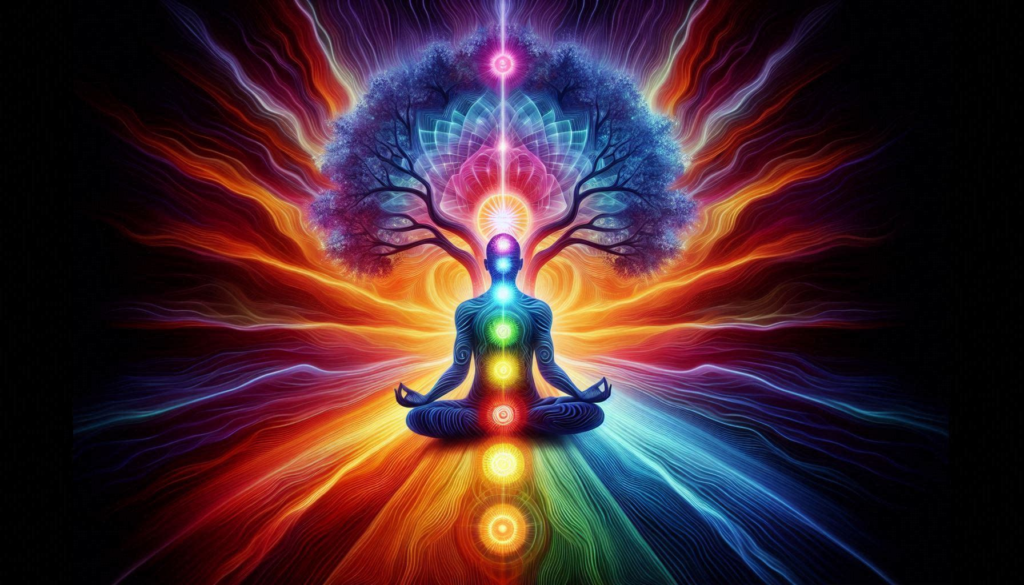Have you ever found yourself lost in a moment, completely absorbed in your surroundings, and feeling a deep sense of peace and tranquility? If so, you’ve experienced a state of mindfulness. Now, imagine feeling a profound connection to the universe, a sense of purpose, and a deep understanding of your place in the world. That’s spirituality.

Mindfulness and spirituality, two age-old concepts, have been gaining traction in our fast-paced, modern world. Why, you ask? Well, it’s because they offer a refuge, a sanctuary of calm and serenity amidst the chaos of our daily lives. They provide a path to inner peace, a journey towards self-discovery, and a gateway to a more fulfilling life.
In this article, we will embark on an enlightening journey, exploring the realms of mindfulness and spirituality. We will delve into their definitions, understand their benefits, and discover the profound connection between them. We will also learn about various practices that can help us cultivate mindful spirituality and understand its impact on our daily lives.
So, are you ready to embark on this journey of self-discovery and transformation? Let’s dive in!
2. Understanding Mindfulness

2.1 Definition
So, what exactly is mindfulness? Well, in the simplest terms, mindfulness is the practice of being fully present in the moment. It’s about tuning into the here and now, paying attention to our thoughts, feelings, and sensations without judgment. It’s like taking a step back and observing our own lives from a distance, without getting caught up in the whirlwind of our thoughts.
2.2 Benefits
Now, you might be wondering, “Why should I practice mindfulness? What’s in it for me?” Well, the benefits of mindfulness are manifold.
Firstly, mindfulness helps reduce stress. By focusing on the present moment, we can let go of past regrets and future anxieties, which are often the root causes of stress.
Secondly, mindfulness improves our focus and concentration. In a world filled with distractions, being able to stay focused on a single task is a valuable skill, and mindfulness can help us hone that skill.
Thirdly, mindfulness enhances our emotional well-being. By observing our emotions without judgment, we can understand them better and manage them more effectively.
Lastly, mindfulness can lead to greater self-awareness. By paying attention to our thoughts and feelings, we can gain insights into our own minds, which can lead to personal growth and self-improvement.
So, whether you’re looking to reduce stress, improve your focus, enhance your emotional well-being, or embark on a journey of self-discovery, mindfulness can be your guide.
3. Understanding Spirituality

3.1 Definition
So, what do we mean when we talk about spirituality? Spirituality, unlike a concrete concept, is more of an abstract idea. It’s a broad term that encompasses a variety of perspectives. In essence, spirituality is about feeling a deep connection to something larger than ourselves. It’s about seeking meaning and purpose in life beyond our mundane existence.
3.2 Benefits
Now, let’s delve into the benefits of spirituality. Why should one embrace spirituality? What does one stand to gain? Well, the advantages of spirituality are as diverse as its definition.
Firstly, spirituality can provide a sense of comfort and solace in times of distress. It can act as a beacon of hope when everything else seems bleak.
Secondly, spirituality can foster a sense of purpose and direction in life. It can help us navigate through life’s ups and downs with a sense of calm and composure.
Thirdly, spirituality can promote a sense of connectedness. It can help us feel a part of the larger universe, thus fostering feelings of empathy and compassion towards others.
Lastly, spirituality can lead to improved mental health. Numerous studies have shown that people who are spiritual tend to have better mental health and cope better with stress and adversity.
So, whether you’re seeking comfort, purpose, connectedness, or mental well-being, spirituality can be your guiding light.
4. The Connection Between Mindfulness and Spirituality

Have you ever wondered how mindfulness and spirituality are connected? Well, the two concepts, while distinct, are deeply intertwined.
Mindfulness, as we’ve discussed, is about being fully present in the moment. It’s about observing our thoughts, feelings, and sensations without judgment. On the other hand, spirituality is about feeling a deep connection to something larger than ourselves. It’s about seeking meaning and purpose in life beyond our mundane existence.
Now, here’s where the connection comes in. When we practice mindfulness, we become more aware of our inner world. We start to notice our thoughts, feelings, and sensations with greater clarity. This heightened self-awareness can lead us to question our place in the universe, sparking a spiritual quest for meaning and purpose.
Similarly, when we embark on a spiritual journey, we often turn to mindfulness as a tool to help us navigate the path. Mindfulness allows us to stay grounded in the present moment, which can be incredibly helpful when dealing with the existential questions that often arise on a spiritual journey.
5. Practicing Mindful Spirituality

5.1 Meditation
One of the most common ways to practice mindful spirituality is through meditation. But what does meditating mindfully mean? It’s about sitting quietly, focusing on your breath, and observing your thoughts without judgment. It’s about letting go of the past and the future, and immersing yourself in the present moment.
Meditation can be a powerful tool for cultivating mindfulness and spirituality. It can help you quiet your mind, connect with your inner self, and experience a sense of peace and tranquility. So, whether you’re a seasoned meditator or a beginner, consider incorporating meditation into your daily routine.
5.2 Yoga
Another practice that can help cultivate mindful spirituality is yoga. Yoga is not just about physical postures; it’s also about connecting the mind, body, and spirit.
When practicing yoga, try to stay present in each pose, focusing on your breath and the sensations in your body. This mindful approach to yoga can help you deepen your spiritual connection and enhance your overall well-being.
5.3 Mindful Eating
Mindful eating is another practice that can help cultivate mindful spirituality. It involves paying full attention to the experience of eating, savoring each bite, and expressing gratitude for the food.
Mindful eating can transform a mundane activity into a spiritual practice, helping you cultivate mindfulness and a deeper appreciation for life’s simple pleasures.
6. The Impact of Mindful Spirituality on Daily Life

So, how does mindful spirituality affect our daily lives? Well, the impact is profound and far-reaching.
Firstly, mindful spirituality can help us manage stress more effectively. By staying present and accepting our experiences without judgment, we can navigate life’s challenges with greater ease and resilience.
Secondly, mindful spirituality can enhance our relationships. By being fully present with others, we can foster deeper connections and improve our communication skills.
Thirdly, mindful spirituality can boost our overall well-being. Numerous studies have shown that practices like meditation and yoga can improve our physical health, enhance our mental clarity, and boost our mood.
Lastly, mindful spirituality can foster a sense of inner peace and contentment. By connecting with our inner selves and the world around us, we can experience a deep sense of fulfillment that transcends our external circumstances.
7. Mindful Spirituality in Different Cultures

Mindful spirituality, while universal in its essence, is practiced in various forms across different cultures and religions. Let’s take a look at a few examples.
In Buddhism, mindfulness is a core practice. The Buddha taught mindfulness as a path to enlightenment. Mindfulness meditation, known as Vipassana, is widely practiced in Buddhist traditions. It involves observing the breath and the sensations in the body, cultivating a deep awareness of the present moment.
In Hinduism, yoga is a key practice for cultivating mindful spirituality. The ancient practice of yoga involves physical postures, breath control, and meditation, all aimed at integrating the body, mind, and spirit.
In Christianity, prayer and contemplation are often used to cultivate mindful spirituality. Christians may practice mindfulness through contemplative prayer, where they focus their mind on a word or phrase, or through lectio divina, a practice of scriptural reading, meditation, and prayer.
In Islam, mindfulness is practiced through Salah, the ritual prayer performed five times a day. During Salah, Muslims focus their mind on their connection with Allah, cultivating a state of mindfulness.
In Indigenous cultures around the world, mindful spirituality is often practiced through rituals and ceremonies that connect individuals with nature, their ancestors, and the spiritual realm.
These are just a few examples of how mindful spirituality is practiced in different cultures. Despite the differences in practices, the underlying theme is the same: cultivating a deep awareness of the present moment and a connection with something larger than ourselves.
8. Scientific Studies on Mindful Spirituality

In recent years, the scientific community has shown a growing interest in the field of mindful spirituality. Numerous studies have been conducted to understand its impact on our mental and physical health. Let’s take a look at some of the findings.
Firstly, studies have shown that mindfulness meditation can lead to significant improvements in mental health. It has been found to reduce symptoms of stress, anxiety, and depression. It can also improve attention, memory, and cognitive flexibility.
Secondly, research has shown that spiritual practices, such as prayer and meditation, can have a positive impact on physical health. They have been associated with lower blood pressure, improved immune function, and better sleep quality.
Thirdly, studies have found a strong correlation between spirituality and happiness. People who consider themselves spiritual report higher levels of happiness and satisfaction with life.
Lastly, research has shown that mindful spirituality can lead to personal growth and self-improvement. It can enhance self-awareness, foster a sense of purpose, and promote emotional intelligence.
It’s important to note that while these studies provide valuable insights, the field of mindful spirituality is complex and multifaceted. More research is needed to fully understand its impact and potential benefits.
9. Common Misconceptions about Mindful Spirituality

Mindful spirituality, despite its growing popularity, is often misunderstood. Let’s debunk some of the common misconceptions.
Misconception 1: Mindful Spirituality is a Religion
One of the most common misconceptions is that mindful spirituality is a religion. In reality, it’s a practice that transcends religious boundaries. You can practice mindful spirituality regardless of your religious beliefs or lack thereof.
Misconception 2: You Have to Meditate for Hours
Another misconception is that mindful spirituality requires meditating for hours on end. While meditation is a powerful tool for cultivating mindfulness, it’s not the only way. Simple practices like mindful eating, mindful walking, or even mindful breathing can be just as effective.
Misconception 3: Mindful Spirituality is Escapism
Some people believe that mindful spirituality is about escaping reality. In fact, it’s the opposite. Mindful spirituality is about fully engaging with reality, just as it is. It’s about embracing the present moment, with all its chaos and beauty.
Misconception 4: Mindful Spirituality is Self-Centered
Lastly, some people view mindful spirituality as a self-centered practice. While it does involve turning inward, the ultimate goal is to foster a deeper connection with the world around us. By cultivating mindfulness and spirituality, we can become more empathetic, compassionate, and understanding.
10. Conclusion

We’ve embarked on a fascinating journey through the realms of mindfulness and spirituality, exploring their definitions, benefits, and the profound connection between them. We’ve delved into various practices of mindful spirituality and examined its impact on our daily lives. We’ve also explored how mindful spirituality is practiced in different cultures and debunked some common misconceptions.
Mindful spirituality, as we’ve seen, is more than just a concept or a practice. It’s a way of life. It’s about being fully present in each moment, connecting with something larger than ourselves, and finding meaning and purpose in our existence.
Whether you choose to practice mindfulness through meditation, cultivate spirituality through prayer, or integrate both into your daily life, remember that the journey is uniquely yours. There’s no right or wrong way to practice mindful spirituality. It’s about exploring, experimenting, and finding what resonates with you.
So, as you continue your journey of mindful spirituality, remember to be patient with yourself, celebrate your progress, and most importantly, enjoy the journey. After all, mindful spirituality is not about the destination, but the journey itself.
